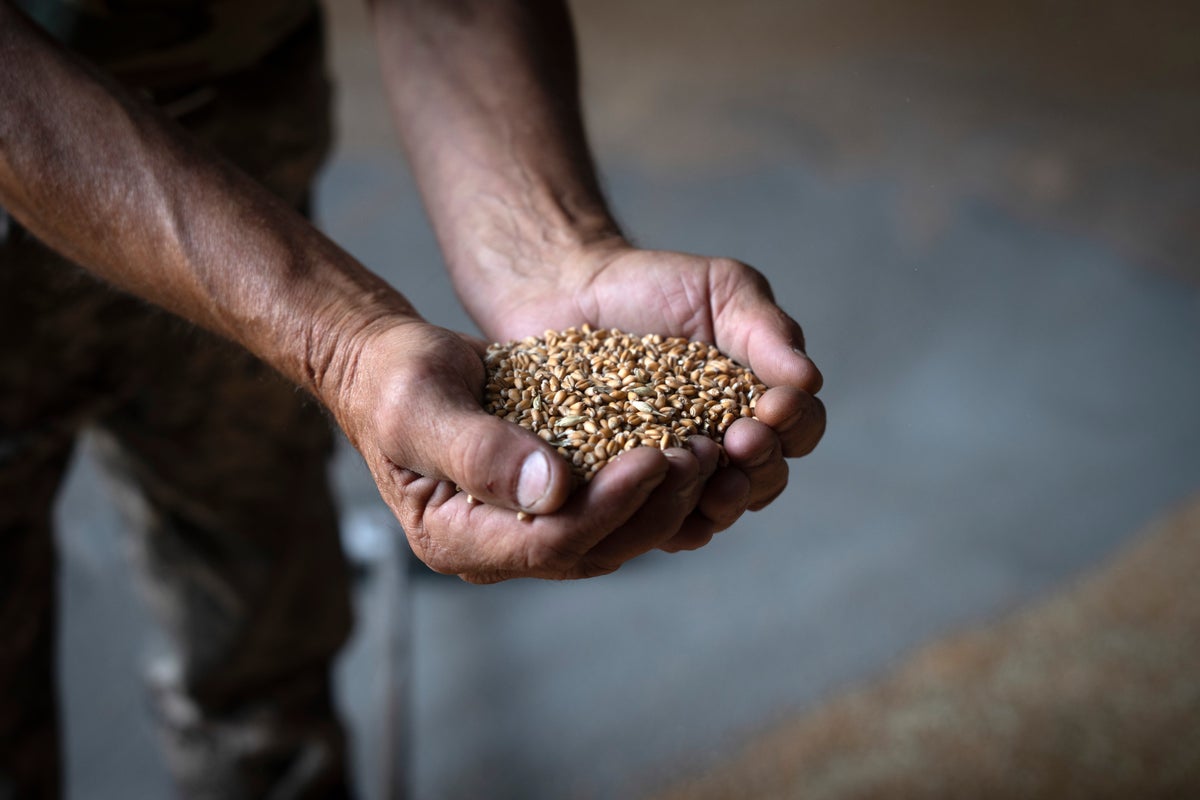
The UK will host a global food security summit in November in response to Russia’s “stranglehold” on grain exports from war-torn Ukraine, Downing Street has announced.
It comes as the Prime Minister prepares to continue his denouncement of Russia’s invasion of Ukraine at the G20 summit in India.
Rishi Sunak will also highlight the impact that Russian president Vladimir Putin’s decision to collapse the Black Sea Grain Initiative, which allowed ships carrying grain to leave southern Ukrainian ports without fear of attack, is having on the world’s poorest.
Once again, Vladimir Putin is failing to show his face at the G20. He is the architect of his own diplomatic exile, isolating himself in his presidential palace and blocking out criticism and reality— Prime Minister Rishi Sunak
Mr Putin has opted not to attend the New Delhi G20 leaders’ gathering in person but his foreign minister Sergei Lavrov is expected to attend.
No 10 has vowed that Mr Sunak will not shy away from criticising Mr Lavrov “to his face” during sessions over the weekend, as the UK Government announced military and financial support to ensure food exports could leave Kyiv.
Speaking ahead of his flight to India on Thursday, the Prime Minister said: “Once again, Vladimir Putin is failing to show his face at the G20.
“He is the architect of his own diplomatic exile, isolating himself in his presidential palace and blocking out criticism and reality.
“The rest of the G20, meanwhile, are demonstrating that we will turn up and work together to pick up the pieces of Putin’s destruction.
“That starts with dealing with the terrible global consequences of Putin’s stranglehold over the most fundamental resources, including his blockade of and attacks on Ukrainian grain.”
Mr Putin has said the Black Sea Grain Initiative, brokered by Turkey and the United Nations, will not be restored until the West meets Moscow’s demands on its own agricultural exports.
Russia refused to extend the deal in July, complaining that a parallel agreement promising to remove obstacles to Russian exports of food and fertiliser had not been honoured — an argument the West rejects.
Before Mr Putin’s attack in February 2022, Ukraine was the world’s fifth largest wheat exporter, fourth largest corn exporter and third largest rapeseed exporter.
The pact, first signed in July 2022 and extended every three months for a year, led to 33 million tonnes of grain and food exports leaving Ukraine, with the majority going to areas of the globe struggling with nutrition supplies, according to the UN.
Ahead of Mr Sunak’s arrival in India, Downing Street announced that the UK would host an international food security summit on Monday November 20.
It is taking place in partnership with the Bill & Melinda Gates Foundation, the Children’s Investment Fund, the United Arab Emirates and Somalia.
Since pulling out of the grain deal, Russia has declared that all ships transiting to Ukrainian Black Sea ports will be treated as military vessels – irrespective of the cargo they are carrying.
The UK Government officials said Moscow had acted upon this stance by firing shots and boarding a cargo ship bound for one of Ukraine’s Danube ports — action London thinks may constitute a violation of international humanitarian law.
No 10 said the UK was gearing up to use intelligence, surveillance, and reconnaissance to monitor Russian activity in the Black Sea, calling out Moscow if there were warning signs that the Kremlin’s forces were preparing attacks on civilian shipping or infrastructure.
It would also attempt to attribute attacks to prevent false flag claims from Russia that aimed to deflect blame onto others.
As part of the surveillance operations, RAF aircraft were conducting flights over the area to deter Russia from carrying out strikes against civilian vessels transporting grain, Downing Street confirmed.
Alongside military efforts to deter Russian attacks, the UK would also contribute £3 million in funding for the World Food Programme to continue work started under Volodymyr Zelensky’s Grain From Ukraine initiative.
The Ukrainian president’s programme was established in November to send his country’s produce to countries where people were suffering from the high global price of staple foods.







